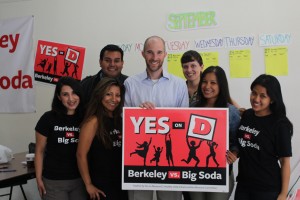A victory towards limiting sugar and improving health
On Tuesday, November 4, Berkeley resoundingly approved with a 73 percent vote the “Measure D,” becoming the first city in the U.S. to successfully levy a tax on sugary drinks.
The first ever ‘soda tax’ took effect January 1, increasing the price of a can of soda by 12 cents and a one-liter bottle by 68 cents. Soda taxes are meant to curb consumption of sugary drinks.

“We fully expect other communities to take on the soda industry and succeed,” said Dr. Vicki Alexander, a co-chair for the “Yes on D” movement. “Berkeley has a proud history of setting nationwide trends, such as nonsmoking sections in restaurants and bars, curb cuts for wheelchairs, curbside recycling and public school food policies. But many communities have the same ingredients that made Measure D possible in Berkeley: proactive parents and community leaders who care about the health of their kids.”
These facts indicate how this is a considerable win for public health:
• Sugar sweetened beverages are the single largest source of added sugars in the American diet, with the average American drinking nearly 42 gallons of sweetened beverages a year, the equivalent of 39 pounds of extra sugar every year;
• Drinking just one soda a day increases an adult’s likelihood of being overweight by 27 percent; for children, the likelihood doubles to 55 percent;
• Drinking one or two sodas a day increases the risk of developing type II diabetes by 26 percent;
• People who consume the average amount of added sugar, equivalent to one soda per day, are 30 percent more likely to die from a heart attack. People who drink 2-3 sodas per day are 2.75 times more likely to die from a heart attack;
• Drinking sugary beverages daily for just two weeks increases LDL cholesterol and triglyceride levels by 20 percent. After six months, daily consumption of sugary drinks increases fat deposits in the liver by 150 percent, which directly contribute to both diabetes and heart disease;
• Children who frequently consume sugary beverages are at dramatically increased risk for dental cavities which can lead to tooth loss;
• Overweight and obesity account for $147 billion in health care costs nationally, or 9 percent of all medical spending – with half these costs paid publicly through the Medicare and Medicaid programs;
• Diabetes cost the U.S. an estimated $245 billion in 2012, with $176 billion in direct medical costs and $69 billion in indirect costs.
It is a proud moment for me personally. I was fortunate to live in Berkeley and actively supported 2011-2012 soda tax efforts led by Dr. Jeff Ritterman, a former chief of cardiology at the Kaiser Richmond Medical Center, city council member and vice mayor of Richmond, California.
I worked for the Center for Weight and Health at the University of California, Berkeley; a research center known for its work in obesity prevention. My research efforts were focused on childhood obesity. During my studies, I discovered that increases in carbohydrate energy, especially in the form of sugar, may be detrimental to the health of children.
I had an opportunity to collaborate and publish my research with Dr. Robert H Lustig, a man who believes sugar is poison! Author of the book “Fat Chance: The Hidden Truth about Sugar, Obesity and Disease,” Dr Lustig is a professor of pediatrics at the University of California, San Francisco. His lecture “Sugar: The Bitter Truth” was posted on YouTube and “went viral” with some 5.3 million viewings.
Being an avid supporter of public health, I admire and congratulate everyone in Berkeley for supporting this initiative and adding one more feather in the community’s crown of setting nationwide trends!
Now the question is, “Will others follow?”
